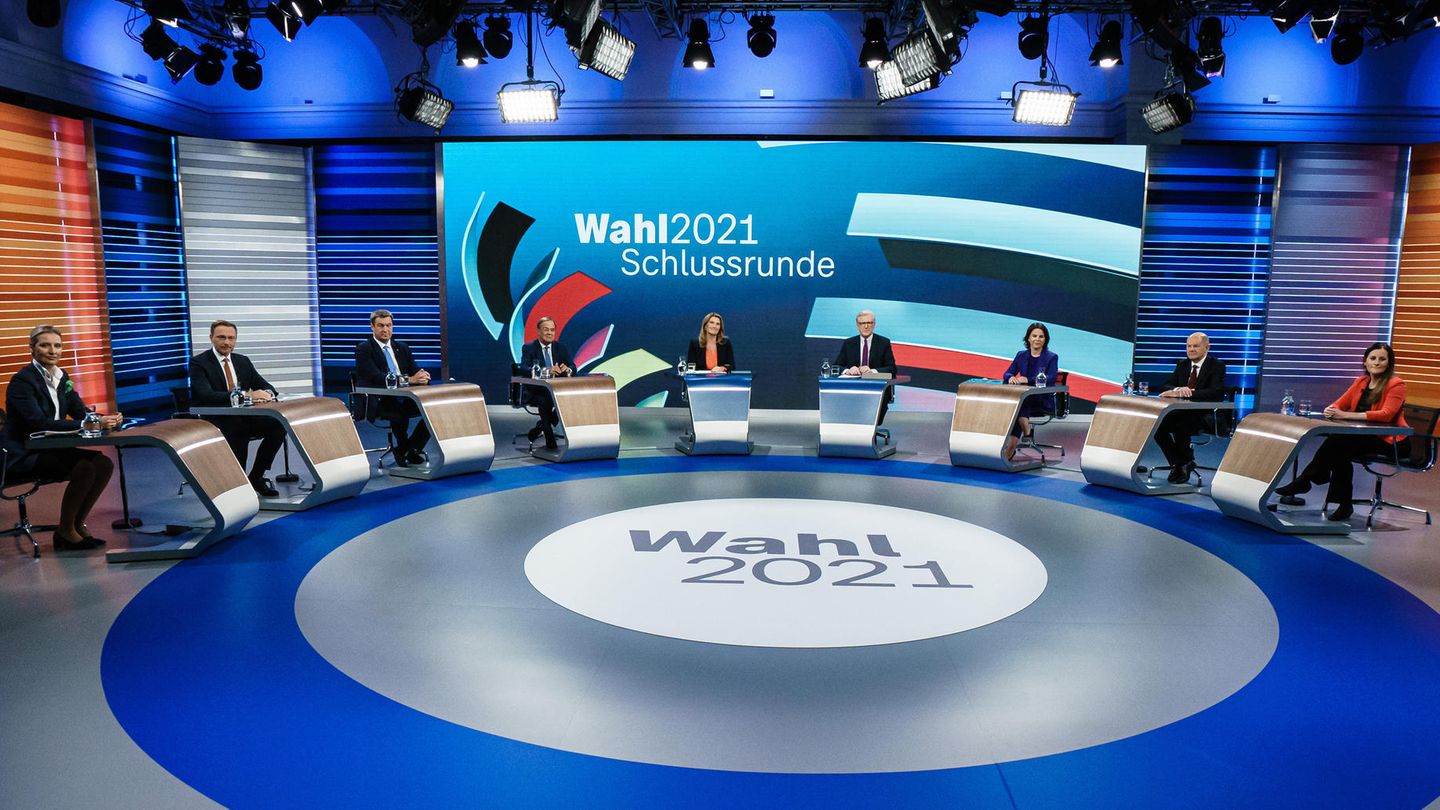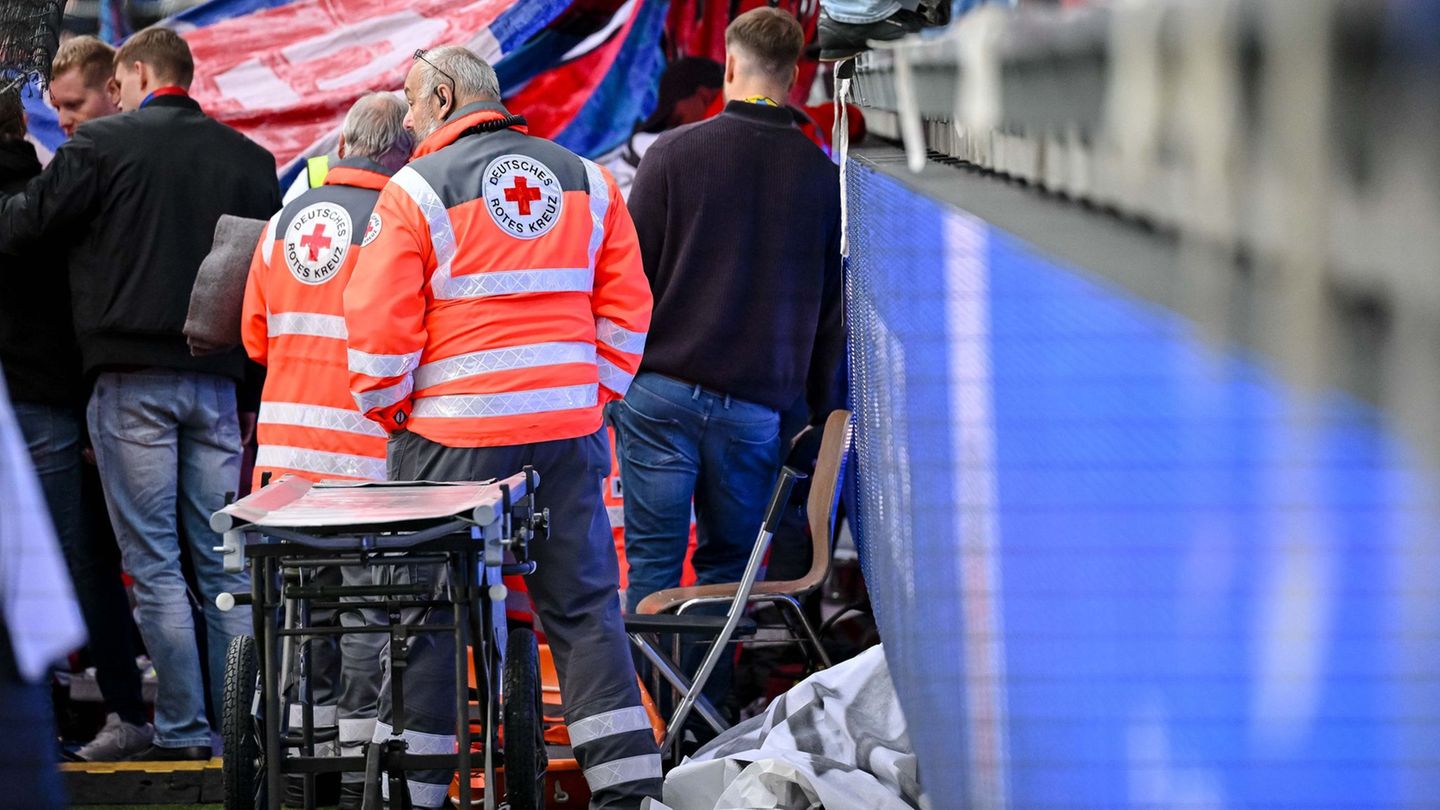It’s the last days before the election. Even the pollsters are gradually falling silent. The contents are exchanged. Now it’s about nuances: who can with whom? In the big final round in the evening, the quieter tones already mattered.
It was the blueprint for the big “elephant round” after the federal election on Sunday: The top staff of all major parties staked out their territories. Less than three days before the polls, the TV “final round” focused on who could fit together – and less on the election results and programs.
ARD and ZDF had arranged the politicians in alleged camps: On the one hand the moderators Left, Greens and SPD, on the other CDU, CSU, FDP, and on the very outside the AfD. But it wasn’t that easy this time when it comes to possible coalitions. You had to pay attention to nuances: who blinked in the direction of which coalition, who kept their distance from whom? And how did the failed and the actual candidate for chancellor of the Union deal with each other? A look at the axes in the dispute between six top candidates and CSU boss Markus Söder:
Do red and green like to join forces?
SPD chancellor candidate Olaf Scholz makes no secret of the fact that the Greens are his favorite coalition partner. In the final round, Green Chancellor candidate Annalena Baerbock left open whether the Greens see it that way and are aiming for a traffic light together with the SPD and FDP – or whether they would rather enter a Jamaica coalition with the Union and FDP. In the last triumph of the Chancellor candidates last weekend, at times you almost had the impression that she and Scholz were closing ranks, for example when they passed the ball to each other on the subject of the minimum wage.
This time the nuances were different: where was the SPD when social housing was abolished, asked Baerbock, for example. Scholz clearly said no to the controversial rental cover, Baerbock avoided a clear position. She explicitly kept her distance from the two current governing parties that are currently dueling in the polls. “The CDU and SPD stand for business as usual,” she said. The Greens wanted to open a new chapter in climate protection – and do so with the parties with whom it would work best. Preferably, of course, emphasized Baerbock, in a government led by green. In the polls, however, that no longer appears to be an option.
FDP plus X
The situation of the FDP is similar to that of the Greens: As things stand at present, coalitions with the Union and the Greens as well as with the SPD and the Greens seem possible. Both could be kingmakers. So far, party leader Christian Lindner has flashed vigorously in the direction of the Union – this time too, but he left a small door open, of all things on the subject of financial policy, the core issue of the Liberals.
Softening the debt brake is “unquestionably” an exclusion criterion for a coalition, Lindner said in the direction of the Greens. At the same time, he emphasized that compliance with the debt brake did not mean that one should not take on debts at all. This is exactly what the SPD intends to do: keep the debt brake in the Basic Law – but borrow as much money as it allows for investments. Lindner describes the complete abolition of the solo as “desirable” instead of an absolute condition. At the same time, however, he emphasized that the overlap in terms of content is greatest in a Jamaica coalition with the Union. “We don’t have green debts or red tax increases.”
The union among themselves – neither new leaders nor trusted unity
There were no new tips against Laschet from Markus Söder. But the CSU boss showed right from his first answer what an election fighter he is – and what the difference to Laschet next to him is. It was about the bloody act of Idar-Oberstein, where a 49-year-old is said to have shot the cashier of a gas station because he pointed out to him that he was required to wear a mask. Söder demanded a “clear stop sign” against those “who want to threaten and intimidate this state”. The pithy words should resonate with Union supporters.
Laschet was only able to watch his old rival from the side in the power struggle for the candidacy for chancellor with a slightly raised eyebrow. The point on the Union’s core issue of internal security went to Söder. Laschet himself went into defense mode right from the start when he was accused that the Union faction had prevented the “defensive democracy law” in the Bundestag. His attack on Scholz in housing policy also fizzled out later: Before a dispute between the two main opponents in the fight for the Chancellery even got going, the moderators changed the subject.
Left hopes?
The left are clearly behind in surveys with six to seven percent, but can still dream of participating in the government – at least if red-green-red came about. Laschet and Söder presented it as fairly certain that Scholz would choose this option. But how close did the left-wing top candidate Janine Wissler actually get to the SPD? In the case of the rent cap and the debt brake, she made the differences clear, but indicated that one could actually speak about the left-wing no to NATO.
The “third moderator”
After almost an hour, Lindner suddenly slipped into the role of the questioner and turned to the right to the person sitting next to him: “How do you feel, Ms. Weidel, that German companies are bought with Chinese capital and that European companies are not possible in China in the same way ? ” ZDF man Theo Koll asked for “a very short answer to our third moderator”.
David William is a talented author who has made a name for himself in the world of writing. He is a professional author who writes on a wide range of topics, from general interest to opinion news. David is currently working as a writer at 24 hours worlds where he brings his unique perspective and in-depth research to his articles, making them both informative and engaging.




